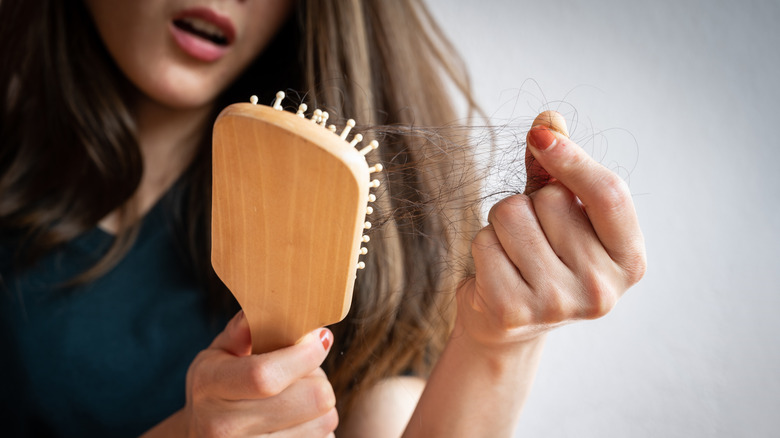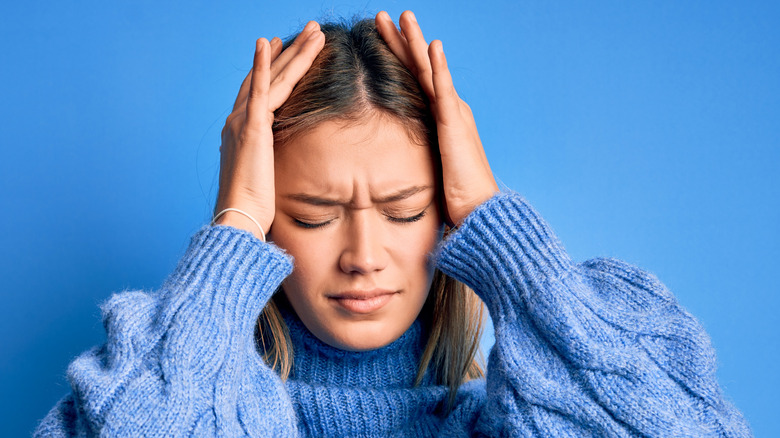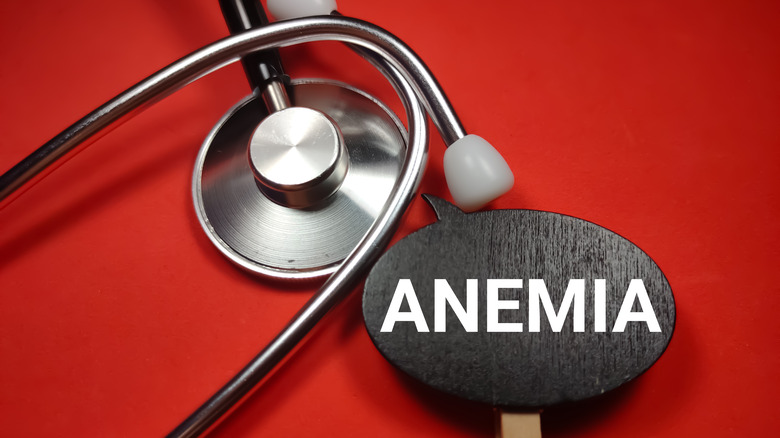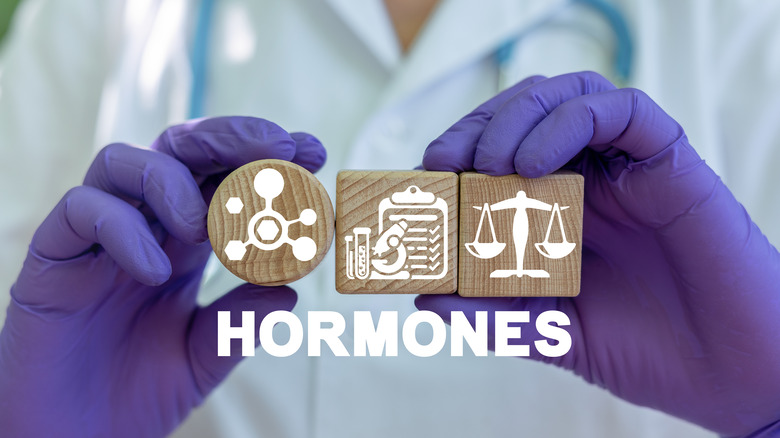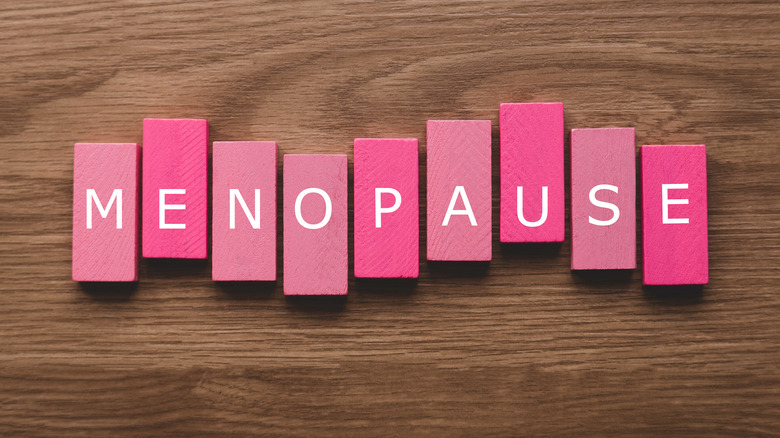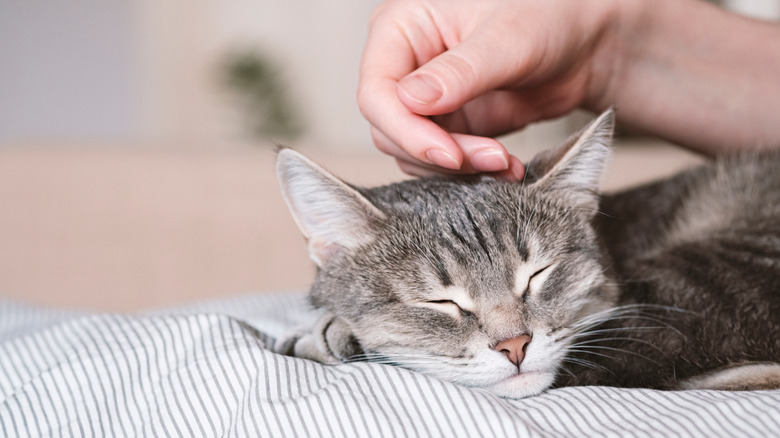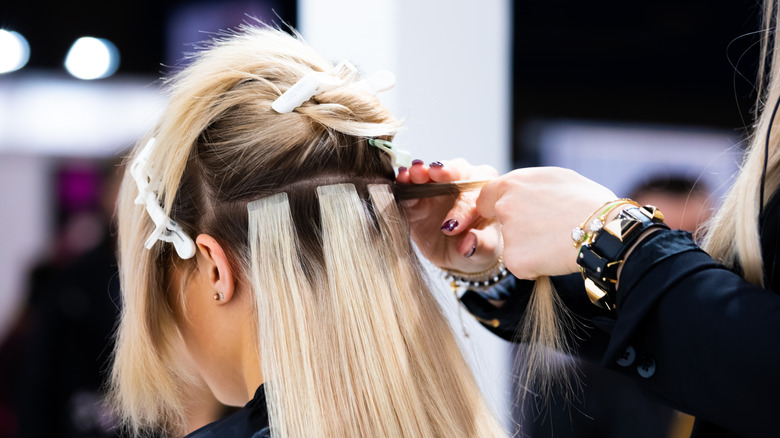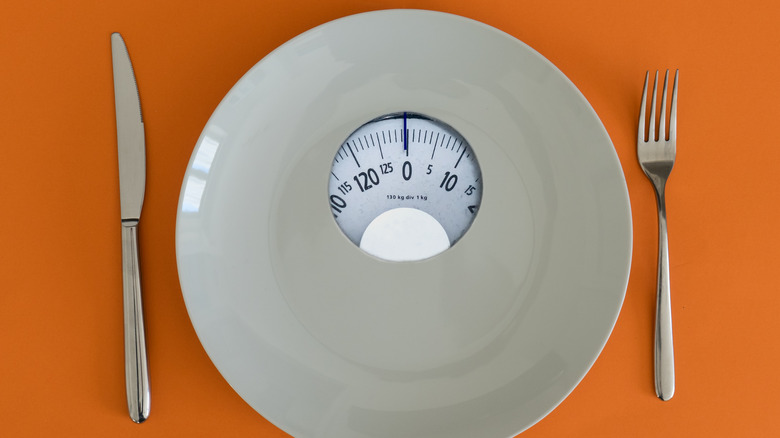14 Reasons You Could Be Losing Your Hair
Hair can be a sensitive subject. Getting a gray hair can be an unpleasant reminder that we're aging. And losing hair can make someone feel so uncomfortable that they might wear a hair piece. However, covering up hair loss and telling yourself that it's just an inevitable part of life could not only be bad for your health, but also might make it harder for you to help your hair grow back.
Yes, you read that right. Not all hair loss is permanent. There are many different possible causes behind hair becoming brittle or falling out more often. And sometimes directly addressing them can help you reduce, if not reverse, their effects on your hair. Case in point, not all types of hair loss involve going completely bald. As the Mayo Clinic points out, hair can fall out a little at a time and not always at the hairline. Some women experience it on their hair's part. Other people might have small patches of hair missing. And still others might experience scaly skin in connection to their hair loss.
In short, hair loss is not necessarily unavoidable or completely irreversible. It greatly depends on what is causing it. Let's dig into some of the more common factors behind hair loss, and what you can do about them.
Stress
When something really stresses us out, we might say that we are ready to tear our hair out. But according to the Mayo Clinic, stress, as well as other related emotions like frustration and tension, can cause a condition called trichotillomania where you cannot suppress the urge to pull out your hair. Of course, not everyone who feels stress is going to experience trichotillomania, but hair loss is a definite possibility if you're feeling tense.
Additionally, as Medical News Today explains, a stress-related form of hair loss is telogen effluvium. Keep in mind that hair goes through stages of growth and regrowth where new hairs develop and take the place of the older hairs, which naturally shed. Unfortunately, stress can lead to a smaller number of hairs developing during the first stage, which means fewer hairs will sprout to replace the lost hairs. And while you're not likely to go bald because of telogen effluvium, your hair might temporarily appear thinner.
In addition to telogen effluvium and trichotillomania, a person can also develop alopecia areata because of high stress levels (via Mayo Clinic). This condition leads to hair loss because it throws off the immune system, which goes after one's hair follicles the same way it would normally defend the body against dangerous invaders like viruses
Not enough iron
Imagine this: A friend of yours mentions that they're frustrated with their hair. They half joke that they could practically make a toupee from how much has been winding up in their hairbrush. And they don't even want to try to describe how much hair is in their bathtub's drain every time they take a shower. But after complaining, they sigh and say that they must be getting old and just going bald. And while that's a possibility, there might be another reason for their hair loss — a reason that has a solution.
According to Healthline, the type of hair loss the person in the above scenario is experiencing could be a sign of an iron deficiency. Remember, your circulatory system is responsible for transporting oxygen throughout your body. It does this via a pigment found in red blood cells called hemoglobin. However, your body needs iron to make hemoglobin. So if you're not taking in enough iron, your blood cannot transport oxygen as efficiently to different parts of your body, including the cells that are crucial for your hair to grow strong and healthy.
If a blood test shows you are losing hair because of an iron deficiency, you might want to adjust your diet to include more foods that are good sources of iron like salmon, spinach, pork, and peas (via Healthline). You also might want to add more broccoli, oranges, tomatoes, strawberries, and other vitamin C-rich foods to your diet, since vitamin C helps your body absorb iron.
Hormones
Undoubtedly, you've known someone who once had a full head of hair who has gone bald or has lost a noticeable amount of hair from the top of their head. Usually, this is chalked up to bad luck in terms of genes. In other words, if your father or grandmother lost their hair, then it's assumed you will eventually follow in their footsteps (via MedlinePlus). And, yes, there does seem to be a genetic factor when it comes to this type of hair loss, but the more direct cause of it is a specific type of hormone.
Before we go any further, it's important to understand that both men and women can experience the hair loss condition androgenetic alopecia, more commonly called female or male pattern baldness. It manifests differently depending on sex, with men typically experiencing a receding hairline and women usually experiencing more widespread hair loss all over the head. However, the underlying cause is the same. Both men and women produce dihydrotestosterone, which is a type of androgen hormone that helps your hair grow properly. When the body starts making too much of this hormone, it can disrupt hair's natural growth cycle, leading to weaker hair strands and a slower development and growth of new hair.
Although this type of hair loss is sometimes associated with getting older, that's not always the case. As MedlinePlus explains, androgenetic alopecia can start as early as the teen years, although the odds of it do go up considerably for men after their 50th birthday and for women following menopause.
Menopause
Often referred to as "the change of life," menopause is when a woman's body begins producing hormones at different rates, which eventually leads to her no longer having a menstrual cycle (via Healthline). While this process can vary from woman to woman in terms of its side effects, it's not uncommon for a woman to lose hair as a result of these hormone fluctuations.
According to Healthline, data has found that women produce less progesterone and estrogen during menopause. Since these hormones are important for hair growth, lower levels can lead to hair not growing as quickly. While a woman is not likely to experience balding the way a man would, she might find that more hair comes off in her hairbrush while she's styling her do. And although it's normal to lose some hairs while showering, women undergoing menopause might see more hairs than normal collecting in their shower's drain.
Besides lower levels of progesterone and estrogen, a woman experiencing menopause might produce more of another type of hormone called androgens. And while higher levels of this hormone can cause facial hair, it can also contribute to hair loss on the top of a woman's head. But with all that said, there is some good news: Hair loss due to menopause is usually not permanent, and diet, exercise, and stress management can all help with hormone imbalances and their side effects, including their impact on your hair.
Too much vitamin A
For many people a multivitamin is as much a part of their breakfast as a cup of coffee or a slice of toast. And, yes, getting the right amount of nutrients like vitamins and minerals is important for your overall health. However, overdoing your vitamin intake can be counterproductive and cause health issues, including hair loss.
While vitamin A is important for several systems in your body, including your circulatory, respiratory, excretory, and immune systems (via National Institutes of Health), too much of it can lead to a condition called hypervitaminosis A, more commonly called vitamin A toxicity (via Healthline). And the effects of hypervitaminosis can occur mere hours after you take in too much vitamin A (depending, of course, on the amount you consumed).
While hair loss is a telltale sign that you might have too much vitamin A in your system, it's only one of a number of possible health problems that could occur because of hypervitaminosis (via Healthline). So, if you're experiencing hair loss as well as ulcers in your mouth, pain in your bones, cracks in your fingernails, changes in appetite, nausea, vomiting, blurry vision, dizziness, and/or jaundice, you should seek medical help. In addition, vitamin A toxicity can lead to skin issues like dryness, itchiness, and roughness.
Ringworm
Normally we associate ringworm with cats, but make no mistake, we humans can develop it too. In fact, according to WebMD, you can catch ringworm from animals or other people since this infection is contagious and can be spread via contact with the skin. Even soil can be a potential source for the fungus that causes ringworm (yet another good reason to wear gloves if you garden). But no matter where you come in contact with ringworm-causing fungus, you could wind up losing hair as a result of this ailment.
It can be difficult to recognize a case of ringworm when it's first developing. As WebMD explains, in cases on the scalp, it usually starts out as a pimple. But as the infection progresses, that pimple becomes larger until it becomes itchy, red, scaly patches of skin where the hair is brittle and falling out. Someone with ringworm also might experience oozing and blistering. And one of the biggest telltale signs of ringworm is that the center area of a bald spot could have healthy looking skin while the area surrounding it appears to be infected. In fact, this "ring" of infection is the origin of the name ringworm.
While ringworm can be an unpleasant ailment, its affects are normally temporary. Some cases clear up on their own without any need for medication. However, if you suspect you have ringworm, contact your healthcare professional immediately. There are medicines that can speed along your recovery.
Lupus
We rely on our immune systems to protect us from dangers like viruses. But if a person has an autoimmune condition like lupus, then their own immune system turns against them and begins attacking the body's cells (via Healthline). As you can imagine, this can cause a number of health problems, including a type of hair loss called alopecia areata.
Hair loss associated with lupus tends to occur in patches. In fact, these patches can be an early red flag that a person has lupus, along with other possible symptoms like rashes, exhaustion, swelling in the joints, and elevated body temperature. And while a person with lupus might notice spots of missing hair on the top of their head, alopecia areata can also cause hairs to fall out of their beards, eyebrows, and eyelids (via American Academy of Dermatology Association). In addition, alopecia areata can affect the hair inside a person's ears and nose, as well as their armpits.
An important point to remember about lupus is that its symptoms are not always consistent (via WebMD). While one person may experience hair loss that never improves, someone else could have periods of time where their hair falls out followed by an improvement in hair growth. Regardless, lupus is a serious condition, so if you think you've developed it or are experiencing a flare, seek medical help.
Hair styles and accessories
One of the fun aspects of hair is getting to try out different styles. From simple ponytails to elaborate braids, and color treatments to perms, the sky's the limit when it comes to how many different ways a person can change and re-change their hairdo. But unfortunately, some of the most popular ways to wear your hair can lead to hair loss.
As Medical News Today explains, styling your hair in certain ways, especially for an extended period of time, can put stress on your hair's follicles. This can lead to a number of problems like redness, pimples, and scarring on the scalp. Eventually, the hair can break off in patches and begin falling out at the hairline. Some of the worst offenders when it comes to this form of hair loss, known as traction alopecia, are hair extensions and weaves, braids, and tight buns and ponytails. Chemicals like hair relaxers can also weaken your hair and increase the chances of it falling out.
Besides hair styles, what you wear in your hair can also cause traction alopecia. Accessories like elastic bands can make your hair fall out if you constantly wear them too tightly. Hair grips and slides can also put stress on your hair's follicles depending on how often you wear them and if you wear them in the same spot. Plus, sports helmets can also lead to hair loss, especially on the areas of your head that the helmet rubs up against.
Pregnancy
Imagine this: You have two friends who are both expecting, but while one's hair is falling out, the other's has never looked more full. Indeed, it is possible to either have fuller hair or less hair in connection to a pregnancy. Although a woman's estrogen levels usually increase during pregnancy (which can make her hair thicker), she also could experience a form of hair loss called telogen effluvium (via Healthline). This can occur because a woman's body begins producing a different amount of hormones in response to becoming pregnant. This hormonal flux can cause some of her hair not to cycle through the natural phases of hair growth and regrowth. As a result, this can triple the amount of natural shedding that someone typically experiences in a day.
In addition to hair loss occurring during pregnancy, telogen effluvium can also happen in the months following a woman giving birth, since her estrogen levels drop. However, in both cases the hair loss is usually temporarily. And one more important note: Hair loss that occurs during pregnancy can also be connected to other health conditions that might occur in conjunction with a pregnancy like anemia (low iron) or a malfunctioning thyroid. So if you're pregnant and losing hair, you should let your healthcare professional know. Otherwise, you might be missing a red flag of more serious health concerns.
Medications for heart-related health concerns
As Everyday Health explains, some medicines commonly prescribed for your heart and your circulatory system can be toxic to your hair's cells. ACE inhibitors, for example, help to lower blood pressure by making the blood vessels more limber, but have been shown to interrupt the growth cycle of hair (via Everyday Health). Beta blockers, which are also prescribed for high blood pressure because they can help take pressure off your heart, can also be damaging to your hair. In addition, blood thinners can negatively affect all the hair on your scalp. And medications prescribed for other conditions like seizures and depression can also cause hair loss.
Although the idea of a medicine making your hair fall out can be disquieting, there's some good news: Hair loss caused by medications is usually not permanent. Plus, your healthcare professional might be able to help you by changing medications. In general, if your hair starts changing after you begin taking a medication, let your healthcare professional know.
Weight loss
It's important to understand that there is no one perfect healthy weight for everyone (via Medical News Today). After all, we're all different heights and builds, which are important factors when determining the right weight range to meet our health needs. Sometimes losing weight helps one achieve a healthy weight goal. However, if you're aiming to shed pounds, you may want to know that losing weight quickly can cause hair loss (via Health).
As Dr. Mark Hammonds, a dermatologist with Scott & White Clinic in Round Rock, Texas, told Health, "Sudden weight loss seems to shock the system and you'll have a six-month period of hair loss and then it corrects itself." Of course, crash diets where you might not be getting the nutrients you need can be a culprit behind this form of hair loss. But even healthy diets can have this effect on one's hair until your body has a chance to adjust.
In addition to dieting, weak hair that's more likely to fall out can be a red flag of anorexia nervosa, where a person goes to extreme measures like eating far too little and incorrectly using products like enemas and laxatives because they're terrified of weight gain (via Mayo Clinic). And make no mistake, this can be a fatal disorder. So, if you or someone you know has been experiencing hair loss, as well as other possible signs of anorexia like eroded teeth, extreme exhaustion, discolored fingers (usually bluish), jaundice, dizzy spells, or calluses on their knuckles, seek medical help immediately.
If you are struggling with an eating disorder, or know someone who is, help is available. Visit the National Eating Disorders Association website or contact NEDA's Live Helpline at 1-800-931-2237. You can also receive 24/7 Crisis Support via text (send NEDA to 741-741).
Thyroid disorders
Quick pop quiz: Does your thyroid impact your metabolism, or how you utilize the oxygen you take in? If you guessed it does both, then you're absolutely correct. As Dr. Abraham Armani, a hair-restoration surgeon and hair loss specialist, told WebMD, the hormones secreted by your thyroid affect many different functions of your body, ranging from how you feel emotionally to how fast or slow your heart beats. If your thyroid isn't functioning properly, it can also lead to health problems like hair loss.
Before we go any further, it's important to understand that there are different ways your thyroid can malfunction. In some cases, a person can have a sluggish thyroid that is not producing enough hormones. This condition is called hypothyroidism. And since your thyroid affects how your body makes use of energy and oxygen (including your hair's cells), an underperforming thyroid can disrupt your hair's natural growth and regrowth cycle. Once this happens, hair loss might not be far behind.
On the other hand, a person can have a hyperactive thyroid that might also unbalance their body's chemistry (via Mayo Clinic). And even though this disorder (known as hyperthyroidism) is the opposite of hypothyroidism, it too can disrupt your hair's normal cycle and cause your hair to become weaker and thinner in texture.
Not eating enough protein
Let's pretend that you're planning a day trip and only have a certain amount of money. Of course, you'd need to earmark some of it for things like gas/transportation and food. Because of this, you might have to cut down on other items on your list like shopping. Similarly, your body has to make decisions on how to best use the nutrients and materials you take in. And if you don't consume enough protein, your hair is going to suffer.
As Dr. Shani Francis, medical director and chief wellness director of Ashira Dermatology, told Livestrong, if there isn't enough protein to go around, your body is going to send it to your muscles, not to your hair. And since your hair is mainly composed of keratin (which is a type of protein), this can lead to less healthy and weaker locks. In fact, a report in Dermatology Practical & Conceptual found that not getting enough protein can lead to hair loss.
In addition to emphasizing the importance of protein, Dr. Francis also told Livestrong that anyone following a vegan diet plan should do so under the guidance of a dietitian. Remember, veganism is when someone not only doesn't eat foods that involving the killing of animals, but also won't consume products that come from animals like eggs — and these foods can be key sources of "complete" proteins (via Medical News Today and Harvard T.H. Chan School of Public Health). So, if you're a vegan and are losing your hair, you might need to add more protein-rich plant-based foods to your diet, and make sure your protein sources complement each other so you're getting all the necessary protein components for your body's optimal health and functioning.
Chemotherapy
It's pretty common knowledge that hair loss can be a side effect of chemotherapy. In fact, the condition's official name is chemotherapy-induced alopecia (via Medical News Today). But why do some people who have chemotherapy lose their hair, and why do others not experience the same level of hair loss? Well, a major part of the answer is that your hair and a cancerous tumor have something in common.
In order for your hair to constantly keep growing and re-growing, its cells need to divide more often and more quickly than other types of cells in your body (via Medical News Today). Unfortunately, this is also what happens with the cells in a malignant tumor. And since chemotherapy attacks tumors by targeting rapidly dividing cells, hair cells can also be affected by this common cancer treatment. Of course, how much hair is lost can vary depending on factors like what chemotherapy drugs are being used and how often someone is being treated. With that said, it is possible to begin seeing hair loss in less than one week after beginning chemotherapy.
While there are many more serious health concerns connected to cancer than hair loss, for some it can be a deterrent to getting chemotherapy. However, chemotherapy-induced alopecia is normally a temporary condition. In fact, one's hair typically begins growing back anywhere from one to three months after their last chemotherapy session.

